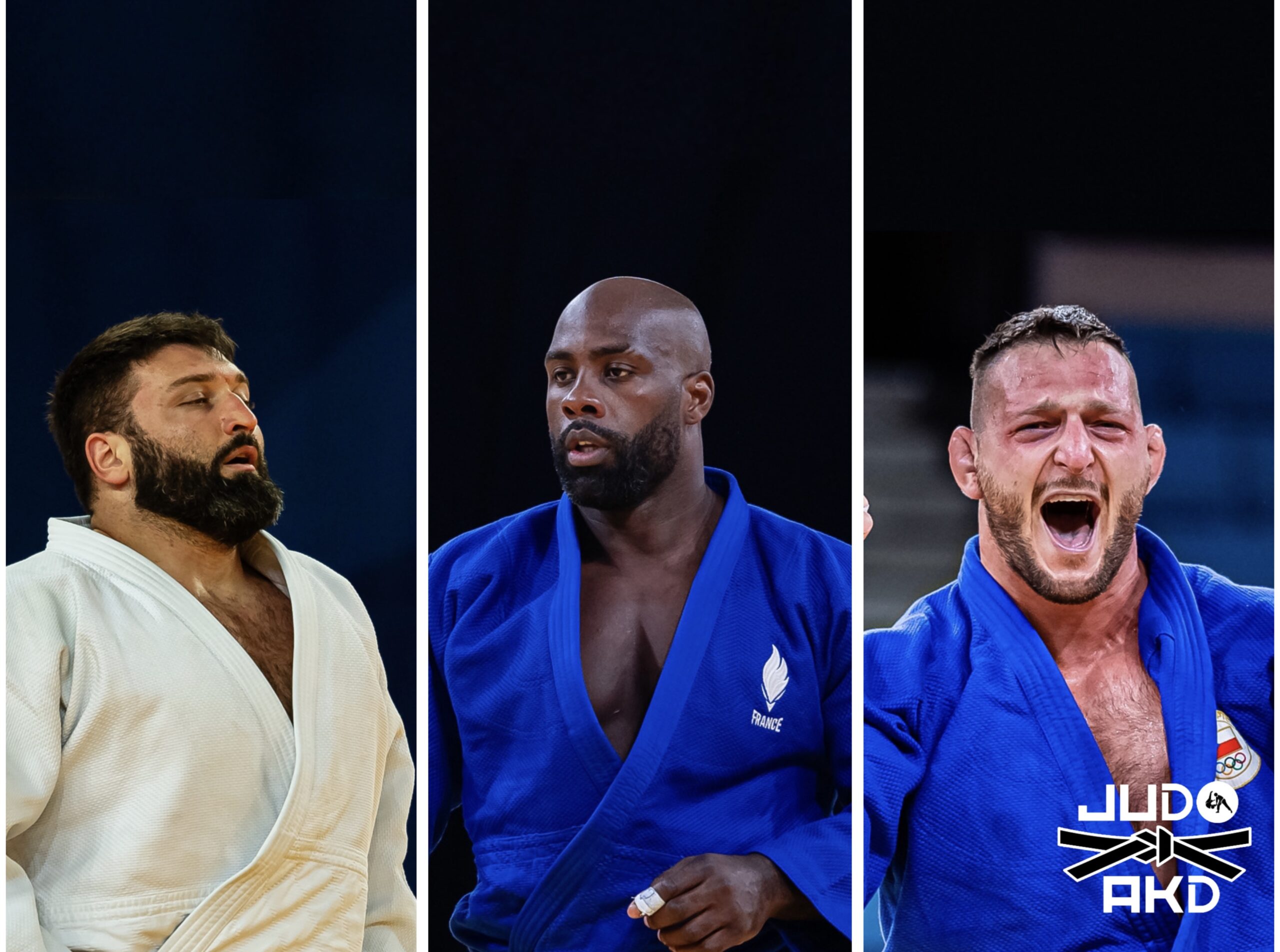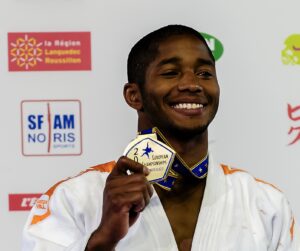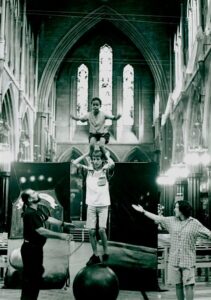Born on April 7, 1989, in Pointe-à-Pitre (Guadeloupe), Teddy Riner is the most decorated judoka since the World championships became an annual event in 2007—the year of the first of his fourteen individual world titles to date: three at the Olympics, eleven at the World championships, in addition to his five European crowns in as many participations.
In the spring of 2024, with the Paris Olympics approaching, the entire judo world dreams of seeing this champion, who has transcended his sport, face off against the only two rivals who, on paper, seem capable of matching his dominance: Lukas Krpalek from Czech Republic, a year and a half younger and also a two-time Olympic champion at that moment, and Inal Tasoev from Russia, 26, who has been delivering spectacular performances throughout the Olympic cycle and has not missed a podium since 2019. Alas, for different reasons, neither of them will be there to challenge the « final boss of the game. » A disappointment for purists, but a boost for the legend. A look back at these missed encounters, whose true significance only time will tell. – JudoAKD#029.
A French version of this article is available here.
By successively defeating the Emirati Magomedomar Magomedomarov, the Georgian Guram Tushishvili, the Tajik Temur Rakhimov and the South Korean Kim Min-jong, Teddy Riner claimed his third individual Olympic title on August 2, 2024, in Paris—a colossal achievement in his career. Eight years after his second title, twelve years after his first, and sixteen years after his Beijing podium. A longevity spanning three decades, a feat matched only, in the same period, by Cuba’s O78kg judoka Idalys Ortiz. Born in 1989 like the Frenchman, she had been on the Olympic podium in 2008, 2012, 2016 and 2021 (but with « only » one title), yet this time, she fell in the second round in Paris, undone as much by the muscular explosiveness of Serbia’s Milica Zabic as by two struggling Olympic cycles for Cuban judo since the retirement and subsequent passing of the legendary coach Ronaldo Veitía Valdivié (1947–2022).
That Friday at the Champ-de-Mars Arena, Teddy Riner dominated the O100kg category with his imposing presence and sheer strength. Over the course of the Olympic cycle, he steadily reasserted his authority after a (relative) slump during two seasons of pandemic-related disruption, which had allowed some of his rivals to gain confidence. Declared defeated four times between February 9, 2020, and November 26, 2022—including the last one, in a club team event in Georgia against his fiery successor Guram Tushishvili, which was later annulled due to a blatant refereeing error overlooked in the noise and chaos of the venue—Riner, for a time, seemed to be feeling the effects of both the passage of time and the complacency that often comes with success.
Yet, it was precisely this latter point that Riner and his team focused on in his Tokyo-to-Paris comeback. How could he feel satisfied with « only » two individual Olympic titles at the age of 33, compared to his ten world titles? A sign of this resurgence: in May 2023 in Doha, after a widely discussed final, the Frenchman won his first world gold in six years. But, in an unexpected twist, this time he had to share it.

That day in Qatar, the final pitted him against Russia’s Inal Tasoev, arguably the most consistent O100kg fighter of the Olympic cycle alongside his compatriot, the « master cube » Tamerlan Bashaev. A judo of finesse, all touch and sensation. His impacts, though visually immense, always seem cushioned, as if slow-cooked. The man doesn’t slam. He lays down, he stretches out, he places. From a distance, you’d swear he was embracing.
In Doha, the protégé of former Olympic champion Arsen Galstyan saw himself, for a few seconds, as world champion, having countered a poorly executed attack by the Frenchman in overtime with a rolling move he had already executed hundreds of times in training—one that had even been validated in almost identical fashion in previous matches at the same championships. Except this time, the central referee remained silent and did not request a video review.
The fight resumed and, just as in the 2017 World championships in Budapest when Guram Tushishvili nearly swept him in the early moments of golden score, Teddy Riner immediately engaged his famous « pourri-waza » [i.e a scrappy technique] in the next sequence—a move he had coined himself in 2014 at the European championships in Montpellier. A kind of clearance technique reminiscent of the late Jonah Lomu when the All Black sent both the ball and its carrier Rory Underwood flying into touch in that legendary 1995 Rugby World Cup semifinal between New Zealand and England, like a Caterpillar bulldozer. A scrap dealer’s maneuver, unlisted in any official playbook yet perfectly legal, which once again saved the veteran Frenchman—so often decisive in the clutch moments.
Yet, a few days later, the International Judo Federation reversed its initial decision (and thus the argumentation presented live in the immediate post-match debriefs on Ippon TV by Daniel Lascau, the global refereeing director) and ultimately decided to co-award the world title to both fighters. It was the third showdown between these two—by far the closest one.
Resuming his relentless march forward, which he capped in April 2024 in Zagreb with his second European championship title in four seasons, Inal Tasoev entered the lead-up to the Paris Olympics as the heavyweight to fear. Calm, confident, methodical—the guy no one wanted to face. The dread he inspired was so great that rumors swirled for a time that both Teddy Riner and Japan’s Tatsuru Saito were considering a last-minute trip to Peru despite the jet lag, just to grab a handful of ranking points. The goal? To strategically outmaneuver each other, forcing the other to have the « privilege » of clashing with the Ossetian bear as early as the Olympic quarterfinals. In the end, only the Japanese took the plunge.
And then, sports geopolitics intervened. On June 28, 2024, in light of the ongoing armed conflict in Ukraine, the International Olympic Committee imposed such drastic eligibility criteria on Russian and Belarusian athletes that their governing bodies ultimately decided to withdraw. No Tasoev, then—though he did discreetly make an appearance in the stands to support his longtime friends, Azerbaijan’s Zelym Kotsoiev, eventual gold medallist in the U100kg class, and Greece’s Theodoros Tselidis, born Russian under the name Fedor Celidi and eventual bronze medalist in the U90kg category.
Upon returning home, Tasoev revealed in a local interview that he had even ventured into the warm-up area, where he was greeted by members of Teddy Riner’s staff—but not by Riner himself. An oversight unsurprising to those familiar with the extreme mental bubble in which the highly sought-after Guadeloupean locks himself on competition day. But for the reigning European champion, it was a painful sting—an added wound atop the silent agony of being sidelined from the pinnacle of his sport for reasons beyond the mat. Especially considering the stratospheric level he had displayed throughout the Olympic cycle—a level also reached by his compatriot Matvey Kanikovskiy, another major absentee in the U100kg category. Kanikovskiy’s near-levitational return at the Tokyo Grand Slam in December left many observers pondering how the final Olympic national rankings might have looked if, at the very least, these two had been allowed to set foot on the Parisian tatami last summer.

On August 2, 2024, in Paris, Czech judoka Lukas Krpalek entered the competition as the defending champion. A double defending champion, in fact—having won gold in the O100kg category in 2021 and the U100kg category in 2016. Since the retirement of Japan’s Shohei Ono at the end of 2022—Ono having claimed the U73kg titles both in Rio and Tokyo—Krpalek was the only judoka on the tour to have worn a golden back patch throughout those eight years.
To defy expectations, Petr Lacina’s protégé took on an unprecedented challenge: in January 2023, he announced his goal of qualifying in both of his preferred weight categories. In reality, the challenge lasted only eight months, with a final attempt at U100kg in August at the Budapest Masters pushing his body to the limits of this extreme weight-cutting yo-yo.
Even so, this unparalleled approach allowed the Czech judoka to avoid the excessive pressure tied to his status. How could anyone fault him for not excelling in O100kg when he was also saving energy for U100kg? And how could he be expected to perform at his peak in U100kg when he was holding back for future challenges in O100kg?

Moving under the radar is a brilliantly clever strategy… until the big day. Because on the big day, world rankings matter. And not having gone all-in throughout the Olympic cycle can backfire, leading to the risk of an early and difficult draw. That’s exactly what happened on August 2 in Paris. After a warm-up round against the Dutchman Jelle Snippe, Lukas Krpalek ran into an immovable force—Japan’s Tatsuru Saito, a 160 kg giant even on fasting days, fully determined at that moment to let nothing and no one stand between him and his « national nemesis, » Teddy Riner, the serial heartbreaker of Japanese judoka at major championships for five straight Olympic cycles. The obstacle proved too big, too soon, even for a champion who had won every major title across two weight divisions. He couldn’t evade the sculpted Japanese fighter’s uchi-mata. For the first time in four Olympic appearances—after finishing seventh in London 2012, which he later considered year One of his mental transformation—the Prague native would see neither the quarterfinals nor the repechage rounds.
« I left the Games disappointed because I knew I still had more to give, » he admitted in early December to his compatriot Petr Kaderabec. « I often train with Tatsuru Saito at Japanese camps, and I know he’s an opponent who can absolutely be beaten. » Yet one moment still brought tears to his eyes, he shared with journalist Lucie Vyborna: « My eight-year-old son whispered in my ear that it didn’t matter if I didn’t win a third Olympic gold medal because one day, he would win it instead. »
Come autumn, the Czech champion chose to recharge by chopping wood for elderly people as a volunteer and deep-sea fishing in the Seychelles. He put his judogi back on at the start of the year during the must-attend Austrian training camp in Mittersill, determined to make a strong showing at the World Championships in Budapest in June—the same city where, twelve years earlier, he had won his first senior continental title. The same place where, in October 2020, Inal Tasoev had signaled his arrival for the decade ahead by winning the first Grand Slam event after the COVID lockdown. And the same venue where, in September 2017, Guram Tushishvili and Teddy Riner had written the first chapter of their electrifying rivalry. Age and weight are just numbers. Judo, however, is a circle. —Anthony Diao, winter 2025. Acknowledgments: Angelina Biktchourina. Editing: Thomas Eustratiou-Diao. Cover pictures: ©Paco Lozano/JudoAKD.
A French version of this article is available here.
More articles in English:
-
- JudoAKD#001 – Loïc Pietri – Pardon His French
- JudoAKD#002 – Emmanuelle Payet – This Island Within Herself
- JudoAKD#003 – Laure-Cathy Valente – Lyon, Third Generation
- JudoAKD#004 – Back to Celje
- JudoAKD#005 – Kevin Cao – Where Silences Have the Floor
- JudoAKD#006 – Frédéric Lecanu – Voice on Way
- JudoAKD#008 – Annett Böhm – Life is Lives
- JudoAKD#009 – Abderahmane Diao – Infinity of Destinies
- JudoAKD#010 – Paco Lozano – Eye of the Fighters
- JudoAKD#011 – Hans Van Essen – Mister JudoInside
- JudoAKD#021 – Benjamin Axus – Still Standing
- JudoAKD#022 – Romain Valadier-Picard – The Fire Next Time
- JudoAKD#023 – Andreea Chitu – She Remembers
- JudoAKD#024 – Malin Wilson – Come. See. Conquer.
- JudoAKD#025 – Antoine Valois-Fortier – The Constant Gardener
- JudoAKD#026 – Amandine Buchard – Status and Liberty
- JudoAKD#027 – Norbert Littkopf (1944-2024), by Annett Boehm
- JudoAKD#028 – Raffaele Toniolo – Bardonecchia, with Family
- JudoAKD#030 – Christa Deguchi and Kyle Reyes – A Thin Red and White Line
- JudoAKD#031 – Jimmy Pedro – United State of Mind
- JudoAKD#032 – Christophe Massina – Twenty Years Later
- JudoAKD#033 – Teddy Riner/Valentin Houinato – Two Dojos, Two Moods
- JudoAKD#034 – Anne-Fatoumata M’Baïro – Of Time and a Lifetime
- JudoAKD#035 – Nigel Donohue – « Your Time is Your Greatest Asset »
- JudoAKD#036 – Ahcène Goudjil – In the Beginning was Teaching
- JudoAKD#037 – Toma Nikiforov – The Kalashnikiforov Years
- JudoAKD#038 – Catherine Beauchemin-Pinard – The Rank of Big Sister
- JudoAKD#039 – Vitalie Gligor – « The Road Takes the One Who Walks »
- JudoAKD#040 – Joan-Benjamin Gaba and Inal Tasoev – Mindset Matters
- JudoAKD#041 – Pierre Neyra – About a Corner of France and Judo as It Is Taught There
- JudoAKD#042 – Theódoros Tselídis – Between Greater Caucasus and Aegean Sea
- JudoAKD#043 – Kim Polling – This Girl Was on Fire
- JudoAKD#044 – Kevin Cao (II) – In the Footsteps of Adrien Thevenet
- JudoAKD#045 – Nigel Donohue (II) – About the Hajime-Matte Model
- JudoAKD#046 – A History of Violence(s)
- JudoAKD#047 – Jigoro Kano Couldn’t Have Said It Better
More Replays in English:
- JudoAKDReplay#001 – Pawel Nastula – The Leftover (2017)
- JudoAKDReplay#002 – Gévrise Emane – Turn Lead into Bronze (2020)
- JudoAKDReplay#003 – Lukas Krpalek – The Best Years of a Life (2019)
- JudoAKDReplay#004 – How Did Ezio Become Gamba? (2015)
- JudoAKDReplay#005 – What’s up… Dimitri Dragin? (2016)
- JudoAKDReplay#006 – Travis Stevens – « People forget about medals, only fighters remain » (2016)
- JudoAKDReplay#007 – Sit and Talk with Tina Trstenjak and Clarisse Agbégnénou (2017)
- JudoAKDReplay#008 – A Summer with Marti Malloy (2014)
- JudoAKDReplay#009 – Hasta Luego María Celia Laborde (2015)
- JudoAKDReplay#010 – What’s Up… Dex Elmont? (2017)
And also :
- JudoAKDRoadToLA2028#01 – Episode 1/13 – Summer 2025
- JudoAKDRoadToLA2028#02 – Episode 2/13 – Autumn 2025
JudoAKD – Instagram – X (Twitter).



